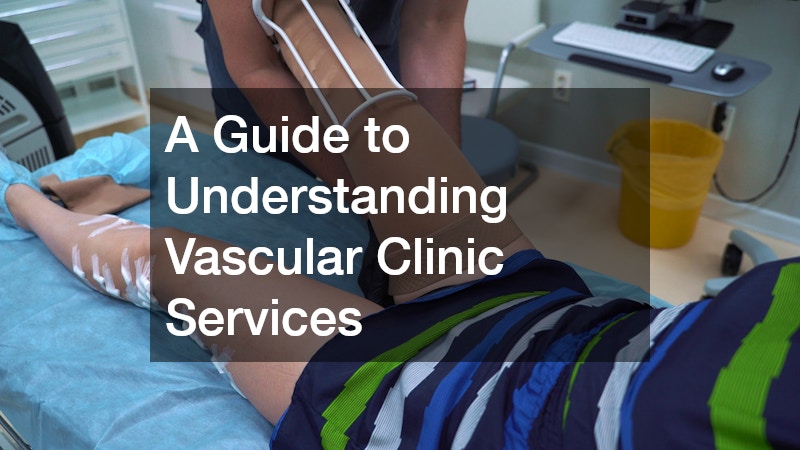
Vascular health is an essential aspect of our overall well-being, yet many people remain unaware of the specialized services that vascular clinics offer. A vascular clinic is designed to diagnose and treat conditions related to blood vessels, including arteries and veins. Understanding the depth of services provided at these clinics can significantly impact a patient's health journey, especially for those with risk factors or existing vascular diseases.
Video Source
This article aims to shed light on vascular clinic services, the conditions typically treated, and the advanced technologies used in diagnostics and treatments. By the end of this guide, readers will have a clearer understanding of how these specialized clinics operate and the vital role they play in vascular health.
A vascular clinic is a medical facility focused solely on diagnosing and treating disorders related to the vascular system, which comprises veins, arteries, and capillaries. Unlike general practices, vascular clinics are staffed with specialists known as vascular surgeons or interventional radiologists who have undergone extensive training in this field. These experts utilize advanced imaging techniques and therapeutic methods to address a broad spectrum of vascular concerns. Common conditions treated include peripheral artery disease, varicose veins, and aneurysms, among others. The primary goal of a vascular clinic is to provide targeted care that improves blood circulation and overall vascular health.
Patients seeking services from vascular clinics often experience symptoms such as leg pain, swelling, or visible veins. These symptoms may indicate underlying vascular issues that necessitate professional evaluation and management. Upon visiting a vascular clinic, patients undergo a comprehensive assessment, including physical examinations and diagnostic imaging. Technologies such as ultrasound, CT scans, and MRIs are frequently employed to visualize the blood vessels and identify abnormalities. Understanding the exact nature of vascular problems is crucial in determining the appropriate course of treatment and enhancing patient outcomes.
Vascular clinics specialize in a variety of conditions affecting the circulatory system. One prevalent condition is peripheral artery disease (PAD), which results from narrowed arteries leading to reduced blood flow, often causing leg pain during activities. Varicose veins, another common issue managed in these clinics, can lead to painful swelling and sometimes indicate underlying venous complications. Additionally, clinics address serious issues such as aneurysms, where the blood vessel wall weakens and bulges, posing a significant risk if left untreated. Overall, the range of conditions treated highlights the critical role that vascular clinics play in managing vascular health.
In most cases, patients with chronic conditions like diabetes or hypertension are at an increased risk for vascular diseases. For these individuals, vascular clinics provide tailored monitoring and therapy options to mitigate further health risks. Regular screenings and prompt treatment interventions can lead to improved management of existing health conditions and help prevent complications such as stroke or limb loss. Recognizing the signs and risks associated with these vascular conditions can significantly change outcomes for affected individuals. This is why awareness and education about the services offered at vascular clinics are imperative for at-risk populations.
Maintaining vascular health is pivotal for overall well-being, as the vascular system plays a crucial role in transporting oxygen and nutrients throughout the body. Compromised vascular health can lead to a myriad of health complications, ranging from chronic pain to life-threatening events such as heart attack or stroke. Therefore, awareness about vascular issues and the available treatment options is essential for timely intervention and prevention. Regular check-ups at vascular clinics can facilitate early diagnosis, reducing the risk of severe health conditions. Educating oneself about the importance of maintaining vascular health is a fundamental step towards adopting a proactive health mindset.
Additionally, proactive vascular health management encompasses adopting a healthy lifestyle, including regular exercise, balanced nutrition, and smoking cessation. Vascular clinics often provide valuable resources and support to help patients make these necessary changes. They may offer specialized programs focusing on diet and fitness tailored for individuals with specific vascular concerns. This dual approach—medical care combined with lifestyle modification—can significantly enhance overall health outcomes. Encouraging a culture of awareness regarding vascular health empowers individuals to take charge of their well-being.
Vascular clinics represent a vital component within the healthcare landscape, focusing on disorders that can have significant impacts on quality of life. Their specialized services, advanced diagnostic techniques, and emphasis on ongoing patient education underscore the importance of maintaining vascular health. By understanding the offerings and capabilities of vascular clinics, patients can make informed decisions regarding their vascular health. Ultimately, awareness and proactive management can lead to improved outcomes and a healthier future.
